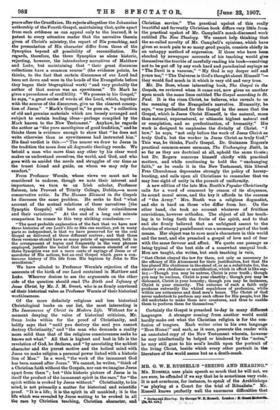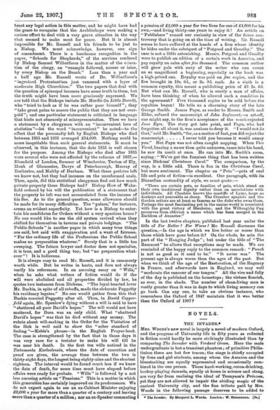MR. G. W. E. RUSSELL'S "SEEING AND HEARING." Ma. RUSSELL
uses plain speech so much that be will not, we are sure, be offended if we say that he is sometimes very rode.. It is not courteous, for instance, to speak of the Archbishops "as playing at a Court for the trial of Ritualists." Mr. Russell knows perfectly well the enormous difficulties that • &dog and Hnoioo. By George W. E. Bone% London : S GroniStobardo. lba id. not] beset any legal action in this matter, and he might have had the grace to recognise that the Archbishops were making a serious effort to deal with a very grave situation in the way that seemed to make most for peace. But it is almost impossible for Mr. Russell and his friends to be just to a Bishop. We must acknowledge, however, one sign of amendment. There is a handsome recognition in the paper, "Schools for Shepherds," of the services rendered by Bishop Samuel Wilberforce in the matter of the educa- tion of the clergy, an "example followed, sooner or later, by every Bishop on the Bench." Less than a year and a half ago Mr. Russell wrote of Dr. Wilberforce's ingrained Protestantism just veneered with a layer of moderate High Churchism." The two papers that deal with the question of episcopal incomes have some truth in them, but the truth might have been more graciously expressed. We are told that the Bishops imitate Mr. Merdle (in Little Dorrit), who "tried to look as if he was rather poor himself "; they " take great pains to assure the public that they are not over- paid"; and one particular statement is criticised in language that hints not obscurely at raisrepresentation. Then we have a statement by a clergyman with an "inconvenient love of statistics "—let the word "inconvenient" be noted—to the -effect that the personalty left by English Bishops who died between 1855 and 1885 averaged £54,000. Nothing could be More inequitable than such general statements. It most be -observed, in this instance, that the date 1855 is well chosen for the purpose. Among the Bishops who died after 1855 were several who were not affected by the reforms of 1837,— Blomfield of London, Sumner of Winchester, Torten of Ely, Monk of Gloucester, Dave of Peterborough, Murray of Rochester, and Maltby of Durham. What these prelates left we know not, but they bad incomes on the unreformed scale. Then, again, did this statistical clergyman find out how much private property these Bishops had ? Bishop How of Wake- field ordered by his will the publication of a statement that the property he left was not accumulated from the income of -his See. As to the general question, some allowance should be made for its many difficulties. The "palace," for instance, ,seems an evident superfluity. Yet bow is a Bishop to enter- lain his candidates for Orders without a very spacious house ? No one would like to see the old system revived when they shifted for themselves in taverns and private lodgings. "The Public Schools " is another paper in which many true things are said, but said with exaggeration and a want of fairness. "For the ordinary life of the Professions the Publio School
• makes no preparation whatever." Surely that is a little too sweeping. The future lawyer and doctor does not specialise, it is true, and a good thing too; but "no preparation what- -ever "! It is ludicrous.
It is always easy to read Mr. Russell, and it is commonly worth while. But he writes in haste, and does not always verify his references. In an amusing essay on " Wills," when he asks what writers of fiction would do if the will were abolished and all properties divided by law, he quotes two instances from Dickens. "The loyal-hearted lover Mr. Barkie, in spite of all rebuffs, made the obdurate Peggotty his residuary legatee." No one would gather from this that Barkie married Peggotty after alL Then, in David Copper- , field again, Mr. Spenlow's dying without a will is said to have "shattered all poor David's hopes." The will would not have mattered, for Dora was an only child. What "shattered David's hopes" was that he died without any money. The rubric about will-making in the Order for the Visitation of the Sick is well said to show the "sober standard of feeling "—Keble's phrase—in the English Prayer-book. The case is strengthened by the fact that in those days it was very rare for a testator to make his will till he was near his death. In the first ten wills noticed in the Testamenta Sarleolensia, where the date of execution and proof are given, the average time between the two is thirty-eight days, the longest being eighty-nine and the shortest eighteen. The interval would be found much less if we knew the date Of death, for some time must have elapsed before affairs were ready for probate. " Wills" is followed by a not less amusing article on "Tensions." This is a matter in which this generatiOn has certainly improved on its predecessors. We do not expect again to see an ex-Cabinet Minister enjoying -npoo a year for more than a quarter of a century and leaving --more than a quarter of a million; nor an ex-Speaker commuting a pension of 22,000 a year for two lives for one of £4,000 for his own,—and living thirty-one years to enjoy it 1 An article on "Publishers" roused our curiosity in view of the fierce con- troversy that is going on at the time of writing. Mr. Russell seems to have suffered at the hands of a firm whose identity he hides under the sobriquet of "Potgood and Groolby." The case is not a little astonishing. Messrs. Potgood and Groolby were to publish an edition of a certain work in America, and pay royalty on sales after five thousand. The common author will grow pale with envy of the writer who can count on so magnificent a beginning, especially as the book was a high-priced one. Royalty was paid on five copies, and the five brought in 18s. 63., or 3s. N. each. As a sixth is a common royalty, this meant a publishing price of £1 2s. 63. But what can Mr. Russell, who is surely a man of affairs, have been thinking of when he allowed such a. condition in the agreement P Five thousand copies to be sold before the royalties began! He tells us a charming story of the late George Smith. James Payn, as reader to Messrs. Smith and Elder, refused the manuscript of John Inglesant,—a set-off, one might say, to the firm's acceptance of the much-rejected Jane Byre. The story got into print, and Payn, who had forgotten all about it, was anxious to deny it. " I would not do that," said Mr. Smith," for, as a matter of fackyou did reject the
manuscript I never told you because it would annoy you." But Payn was not often caught napping. When Vice Pers x, bearing'a name then quite unknown, came into his hand, he saw its merit at once. He ran into Mr. Smith's room, saying " We've got the funniest thing that has been written since Dickens' Christmas Carol." The comparison, by the way, is a little odd. There is fun in the Christmas Carol, but more sentiment. The chapter on "Pets "—pets of real life and pets of fiction—is excellent. One paragraph, with its Disraelian orotundity of style, we must quote :— "There are certain pets, or families of pets, which stand on their own traditional dignity rather than on associations with individuals. All Cheshire knows the mastiffs of Lyme, large as donkeys and peaceable as sheep. The Clumber spaniels and the Gordon setters are at least as famous as the duke who owns them. Perhaps the most fascinating pet in the canine world is associated with the great victory of Blenheim; and the Willoughby Pug preserves from oblivion a name which has been merged in the Earldom of Ancestor."
In the last twelve chapters, published last year under the title of For Better ? For Worse ? Mr. Russell discusses the question,—Is the age in which we live better or worse than those which have gone before it? On the whole, he acts the part of the " Hanging Judge"; but under the title of "The Remnant" he allows that exceptions may be made. We are reminded of the happy reply to the common remark: "Punch is not as good as it used to be." "It never was." The present age is always worse than the ages of the past. But when we think of the age of the Restoration, of the Regency in France, and afterwards here in England, we may well "moderate the rancour of our tongue." All the vieennd folly of the day is published on the housetops ; the virtues flourish, as ever, in the shade. The number of clean-living men is vastly greater than it was in days to which living memory can go baok. Can any one, to take an obvious instance, who remembers the Oxford of 1847 maintain that it was better than the Oxford of 1907











































 Previous page
Previous page